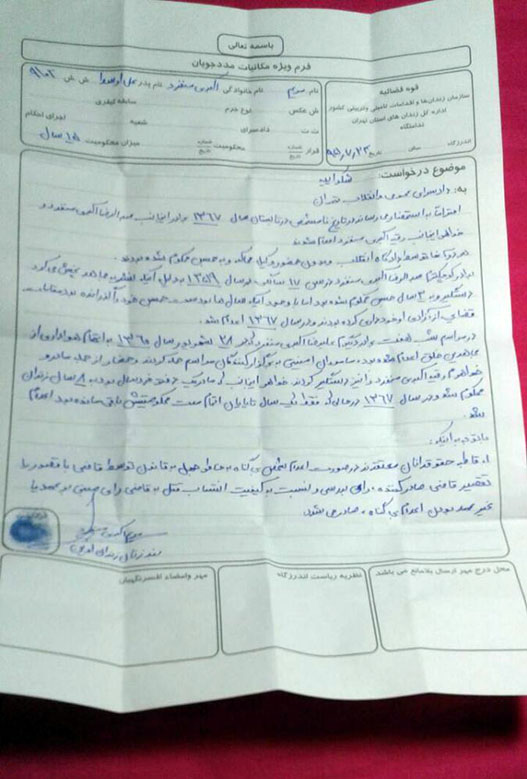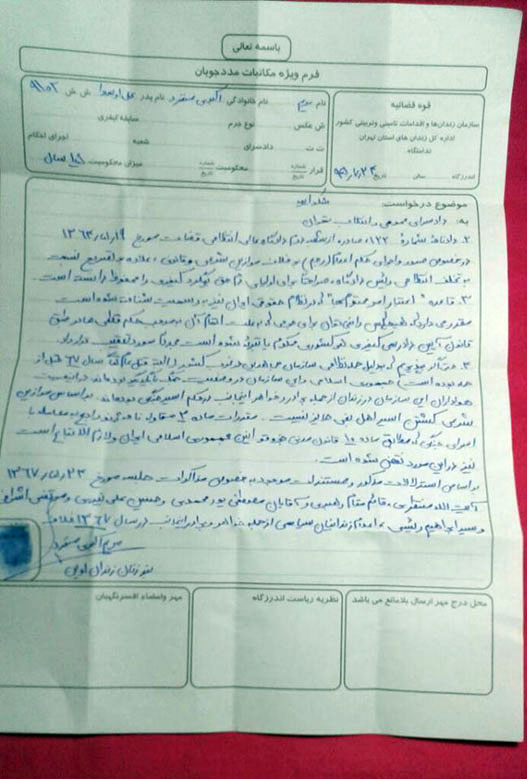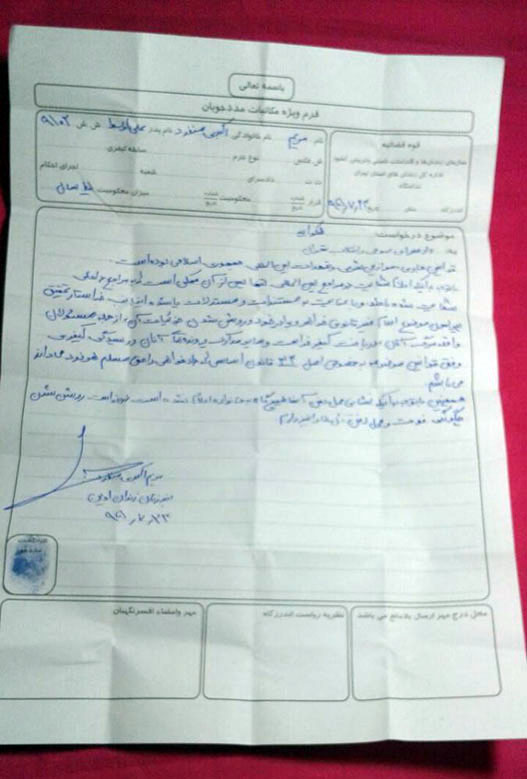Complaint
To the Prosecutor General of Tehran
I respectfully inform you that my brother Abdolreza Akbari Monfared and my sister Roqieh Akbari Monfared were executed on unknown dates during the summer of 1988.
They were both tried by the Revolutionary Court, without access to a lawyer, and sentenced to prison terms. My younger brother Abdolreza Akbari Monfared was arrested when he was only 17 for selling the Mojahed publication (affiliated to the People’s Mojahedin Organization of Iran – PMOI or MEK).
He was sentenced to three years imprisonment in 1980, but the judicial authorities refused to release him after he completed his prison term until he was finally executed in 1988.
During a memorial for my other brother, Alireza Akbari Monfared, who was executed on 19 September 1981 for supporting the PMOI, security forces raided the ceremony and arrested my mother and sister, Roqieh Akbari Monfared. My sister, who had a little daughter, was sentenced to eight years in prison. In the summer of 1988 she was executed while she still had to serve another year in prison.
Given that:
The majority of jurists believe that if an innocent person is executed due to lack of awareness or misconduct of the judge, an investigation must be carried out to determine whether the execution of the innocent was intentional;
Declaration 122 by the second branch of the Supreme Disciplinary Court for Judges on 10 August 1985 on death sentences issued contrary to Sharia and the law, in addition to stipulating the disciplinary violation by the head of the court, specifically points out that the victim’s next of kin has the right to call for a prosecution;
A principle that is recognized by Iran’s judicial system determines that no one can be re-prosecuted for a charge for which a final guilty or innocent verdict had been issued in the course of a proceeding based on a country’s code of criminal procedure;
Even if we accept that due to the PMOI’s armed attack in the west of the country, the Islamic Republic and this organisation were in a state of war against one another, the supporters of this organisation, including my brother and sister, should have been considered as prisoners of war. Based on sharia law, killing prisoners of war is forbidden. The provisions of Article 3 of the Geneva Conventions regarding prisoners of war, which in accordance with Article 10 of the Civil Code is a binding part of the law of the Islamic Republic of Iran, have been violated in this case.
According to the above reasoning and other available evidence, particularly the exchanges during the 15 August 1988 meeting between Ayatollah Montazeri, the designated successor of the supreme leader; and Mostafa Pour-Mohammadi, Hossein-Ali Nayyeri, Morteza Eshraqi and Seyyed Ebrahim Raissi, the execution of political prisoners, including my sister and brother, in 1988 were against the applicable law, Sharia law and international commitments of the Islamic Republic.
As petitioning before international tribunals can only be possible after petitioning before domestic tribunals, I, therefore, call for an investigation into the unlawful execution of my sister and brother and disclosure of the facts including the names of those who were responsible for their deaths, acquisition of their charges and other evidences in their files, and a criminal investigation in accordance with relevant laws in particular Article 34 of the Constitution that recognizes seeking justice as the absolute right of every individual. Furthermore, as the location of their burial has never been declared to the family, I, therefore, seek the facts about their deaths and the location of their burial.
SIGNED
Maryam Akbari Monfared – 15 October 2016
—
Background note: Maryam Akbari Monfared, a political prisoner held in Tehran’s notorious Evin Prison, wrote the letter of complaint on 18 October 2016 to the Prosecutor General of Tehran over the arbitrary execution of her brother and sister during the 1988 massacre of political prisoners in Iran.



